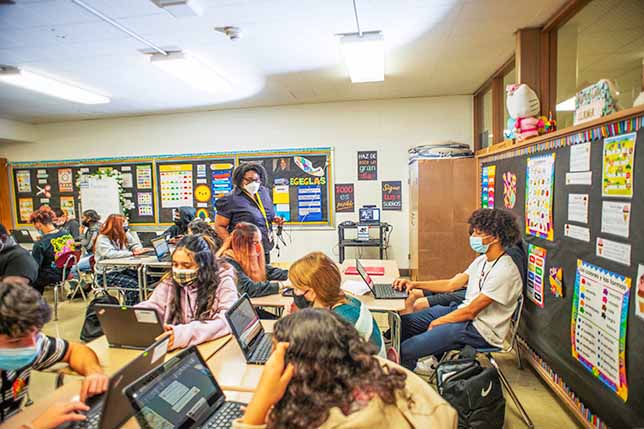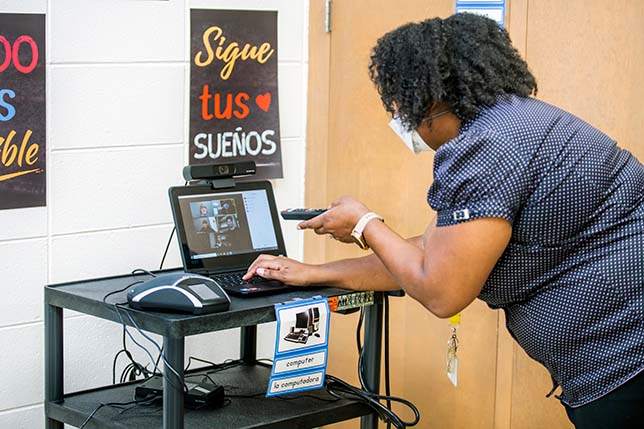Illinois District Chooses Konftel Videoconference System for its Hybrid Learning Classrooms
- By Kristal Kuykendall
- 12/08/21
As U.S. school districts face ongoing uncertainty amid waves of pandemic outbreaks and new variants, hybrid learning has continued to evolve — as has the variety of tools and methods at educators’ disposal.
Like most districts thrown into the deep end of technology challenges during the pandemic, Joliet Township High School District 204 struggled to find the right equipment for hybrid classrooms and blended learning that wouldn’t require a lot of complicated equipment or networking skills — and it had to be flexible in case the pandemic required another sudden switch to all-remote.

The methods Joliet Township teachers tried during the early pandemic months were not feasible long-term, explained Wendy Davis, network and media manager for the district. “Sound was a big part of the challenge,” Davis said. “And teachers said the microphones and cameras built into their laptops weren’t enough.”
Late in 2020, the district — which serves more than 6,000 students, about 30 miles southwest of Chicago — tasked a technology committee with testing five different classroom streaming systems; in early 2021, three systems got a “trial run” in a few classrooms.
The district announced in April that it had settled on a winner: the Konftel C2055Wx videoconferencing system, which has three components: a Konftel Cam20 USB conference camera capable of 4K resolution; a Konftel 55Wx conference phone featuring OmniSound HD audio technology and USB/Bluetooth connectivity for maximum flexibility; and Konftel’s OCC Hub, which comes with three USB ports in and one port out so that connecting the camera, conference phone, and another USB-based peripheral to the teacher’s laptop requires only one cable connection.
Teachers who participated in the district’s trial run praised the high quality of the Konftel camera and conference phone, according a district news release. “I love the speaker. I can talk and move around the room and my students hear me perfectly at home and in class,” one teacher reported.
Prior to the new equipment purchase, Joliet Township had been operating the way many hybrid setups in schools across the country have been: with in-class students logging into a videostream and using headphones to hear their remote classmates.
But the new Konftel system eliminates the need for in-class students to operate through a streaming portal. “I like that when students in class respond to those at home, they can hear them through the speaker, so there's no need for them to even connect to Zoom — giving me the opportunity to give my in-person students a more ‘normal’ school experience,” another teacher reported, according to the news release.
When the fall 2021 semester kicked off, Joliet Township had 375 of the Konftel systems installed and ready to go — enough for every classroom in the district’s two high schools, plus spares for shared spaces, field trips, and the like. The systems retail for $750 to $850 each, depending on the seller.
In addition to the high-quality sound and ease of installation, the district said a major factor in their choice was that the Konftel system does not require its own software or driver; it works with whatever collaboration software the teacher is already using.

Joliet Township district allows its teachers to choose whatever software works best for them for online collaboration, whether it’s Microsoft Teams, Google Meet, or Zoom. “The Konftel solution is plug-and-play, so all a class needs to do is launch its preferred collaboration platform and it’s ready to learn— no additional software is required,” the district noted.
It works with a variety of USB-based peripheral equipment, as well.
“Depending on what you’re teaching, you may have unique hardware,” Davis said. “We’ve got math teachers using Wacom tablets and we have microscopes that use USB. Plus, there’s always the desire to future-proof a system, because we never know what technology will come into the classroom next.”
Find more information about the Konftel C2055Wx at Konftel.com.
About the Author
Kristal Kuykendall is editor, 1105 Media Education Group. She can
be reached at [email protected].